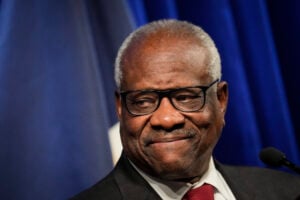[ad_1]

(Photo by Drew Angerer/Getty Images)
This weekend, after getting unceremoniously benchslapped by the Eleventh Circuit, South Carolina Republican Senator Lindsey Graham raced into the open arms of Justice Clarence Thomas, hoping for a bail out.
Graham is fighting a subpoena for testimony about his role in undermining Georgia’s certification of Joe Biden’s 2020 presidential victory, particularly two phone calls to Georgia Secretary of State Brad Raffensperger in which he may have pressed the official to throw out mail-in ballots in Fulton County to flip the state for Trump. Graham has argued that he was just doing his duty as a senator to ensure that Georgia’s electoral votes were legit in preparation for the January 6 vote to certify the election, and thus is immune from questioning. But the appellate court, including two Trump appointees, agreed with US District Judge Leigh Martin May that the Constitution’s Speech or Debate Clause is not an all-purpose get out of jail free card and ordered him to get his flapjacks down to Atlanta and sit in that witness chair.
Graham has been fighting this subpoena since the summer, when he struck out with state court and turned to the federal judiciary for relief. After US District Judge May refused to quash the subpoena, Graham ran to the Eleventh Circuit and was rewarded with a stay and order for the trial court to consider his belated claims of immunity under the Speech or Debate clause. Judge May then ordered Graham to delineate exactly which questions should be off limits to Fulton County District Attorney Fani Willis and her special purpose grand jury. But Graham demurred, instead reiterating his arguments in favor of full quashal, perhaps in the hopes that the Eleventh Circuit would do him a solid and fill in the blanks.
Instead the appellate court endorsed Judge May’s order for partial quashal, which narrowed the parameters of Willis’s inquiry thusly:
As to the issue of partial quashal, the Court quashes the subpoena only as to questions about Senator Graham’s investigatory fact-finding on the telephone calls to Georgia election officials, including how such information related to his decision to certify the results of the 2020 presidential election. The Court finds that this area of inquiry falls under the protection of the Speech or Debate Clause, which prohibits questions on legislative activity. As to the other categories, the Court finds that they are not legislative, and the Speech or Debate Clause does not apply to them. As such, Senator Graham may be questioned about any alleged efforts to encourage Secretary Raffensperger or others to throw out ballots or otherwise alter Georgia’s election practices and procedures. Likewise, the grand jury may inquire into Senator Graham’s alleged communications and coordination with the Trump Campaign and its post-election efforts in Georgia, as well as into Senator Graham’s public statements related to Georgia’s 2020 elections.
The Eleventh Circuit agreed that questions about Graham’s public statements and his coordination with the Trump campaign were kosher because they could not plausibly be construed as legislative activity, and thus do not implicate the Speech or Debate Clause.
Graham immediately appealed to the Supreme Court in a emergency application for stay which could fairly be called disingenuous. Instead of acknowledging that the trial court not only narrowed the scope of the prosecutorial query but provided a means for him to challenge any question to which the senator objects, Graham and his lawyer, former White House Counsel Don McGahn, pretend that the lower courts have authorized a wholesale fishing expedition, and that, absent a stay from the high court, his “constitutional immunities will be lost, and his statutorily guaranteed appeal mooted.”
Graham argues that any questioning at all amounts to unconstitutional probing about his legislative intent, even if it implicates his coordination with the Trump campaign or possibly exhorting a state official to illegally discard Democratic ballots:
The district court was wrong, also, to think that any other lines of hypothetical questioning would be permissible. The subpoena and accompanying certificate made clear that any questioning about “other” topics (such as communications with the Trump campaign) were simply backdoor ways to question Senator Graham about his motives behind his legislative investigation, so that any other sought-after topics rise and fall with the phone calls themselves
He also points to the use of his honorific title as proof that he is being summoned in his official capacity, and thus cannot be asked any questions:
And so the caption of this case again reveals the District Attorney’s error. Here (unlike in, say, Trump v. Vance) she has subpoenaed not citizen Graham, but Senator Graham. The doctrine thus applies, and this Court is likely to grant review and reverse.
And today Justice Thomas, who had ordered DA Willis to respond by Thursday, granted Graham a temporary reprieve, staying the District Court’s order that Graham testify “pending further order of Justice Thomas or of the Court.”
Whether this signals a willingness of the Court to throw itself and the tattered shreds of its reputation on the grenade for Graham, or is just a temporary hiccup, we’ll have to wait and see.
SCOTUS Docket
Fulton County Special Purpose Grand Jury v. Graham [US District Docket via Court Listener]
Liz Dye lives in Baltimore where she writes about law and politics.
[ad_2]




